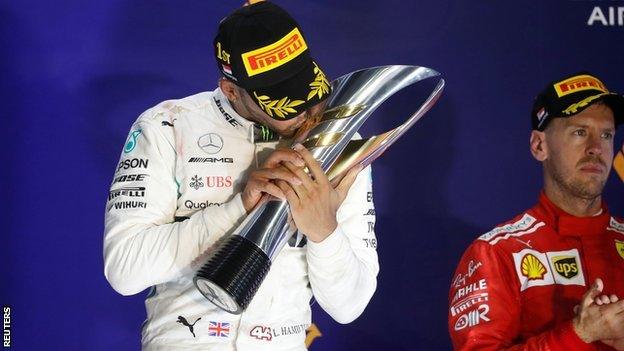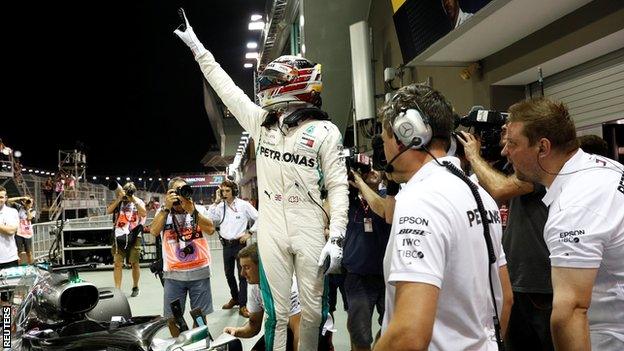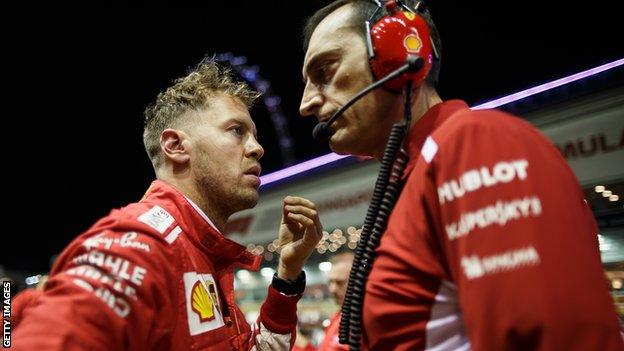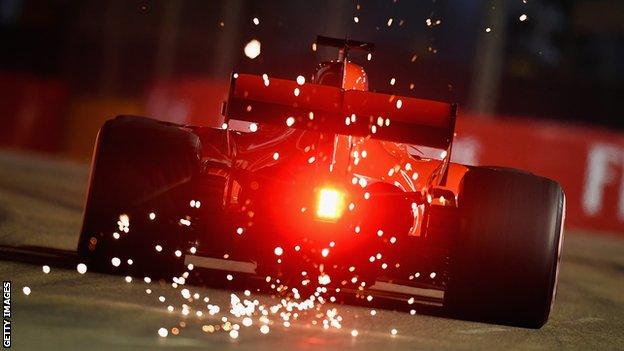'Lewis Hamilton has a hold on the title - thanks to Ferrari'
- Published
- comments

Lewis Hamilton's victory in Singapore extended the Briton's advantage over Sebastian Vettel to 40 points
Lewis Hamilton, through sheer force of his talent, has grabbed hold of this championship with a vice-like grip. But there is no escaping the fact that Ferrari and Sebastian Vettel have helped him along the way.
Each race, Hamilton seems to find new ways to deal another hammer blow to Ferrari's hopes, and his rivals seem powerless to stop him. In fact, the pressure the world champion and his Mercedes team are applying seems to be slowly breaking their rivals' resolve.
Singapore this weekend was another crowning achievement - this time founded on one of the qualifying laps of Hamilton's career. Which, given some believe the 33-year-old is up with Ayrton Senna as the greatest qualifier in grand prix history, is saying something.
It has moved him 40 points clear of Vettel in the championship. Mathematically, Vettel can win the title by two points if he wins every remaining race even if Hamilton finishes second behind him. But, realistically, it is hard to see him coming back with only 150 points remaining on the table.
Hamilton's stardust lays foundation for win

Hamilton described his Singapore pole lap - the 79th of his career - as the "best feeling ever"
Much has been made of Ferrari's operational failings this year. This weekend in Singapore they were more nuanced than at other times, but they were there nonetheless.
Hamilton's qualifying lap was one for the ages. He was 1.3 seconds faster on his first lap in final qualifying than he had been on his final lap in the second session, just a few minutes before. And he was more than 0.6secs clear of Vettel, who had been 0.5secs quicker than his rival in final practice.
In the Mercedes garage, they could not believe what they were seeing. "We knew exactly what split times he was [theoretically] able to do," team boss Toto Wolff said, "and when the sector times kept popping up it was surreal. That was his driving."
Wolff said it was "stardust - the most epic lap I have ever seen from him".
Hamilton's race engineer Peter Bonnington added: "You were impressed by the silence. There wasn't a lot of jumping. It was a lot of jaws hitting the floor, to see a gap like that."
Hamilton described it as "a lap out of nowhere - just flowing, beautiful. It was like a dance. It was awesome. It was the best feeling I've ever had."
It was a great performance from the driver - and from the team, too. Mercedes had worked hard on curing their weaknesses at Singapore - historically a "bogey track", as Wolff described it. And good work it was.
The car looked much more at home around Marina Bay than in some years, even if Hamilton's team-mate Valtteri Bottas said: "It still doesn't feel like the car was made for this circuit. The rear end was difficult out of the slow-speed corners."
But Hamilton's margin in qualifying was not all about him and Mercedes. As the times came in, he ended up only 0.319secs quicker than Red Bull's Max Verstappen - and the Dutchman was on an even quicker lap second time around when an engine hiccup at Turn 16/17 forced him to abort. It was probably not quick enough to take pole, but it would have been close.
Vettel, too, should have been closer, but Ferrari had not managed their qualifying as well as they could have.
First, they tried to get through the second session on the ultra-soft tyre, which was a surprise considering they had just watched Hamilton come within 0.2secs of being knocked out of the first session when Mercedes did the same.
Vettel was not quick enough on his first run, because his warm-up lap had been compromised by traffic, which meant his tyres were not in the best condition. He wanted to go again - Ferrari had decided starting on the ultra-soft was the best race strategy - but his engineers overruled him, saying it was too big a risk.

How costly was Ferrari's decision to pit Sebastian Vettel on lap 14?
Then, in final qualifying, again Vettel was sent out at a sub-optimal time, too close to cars in front to run his optimum 'out' lap. Twice. His tyres were not up to temperature when he started his flying laps, and his chances of pole were gone.
Was this a direct result of the slower-than-ideal out laps? Insiders said yes. But falling track temperatures may also have played a role - perhaps Ferrari's car was better set up for the hotter conditions in final practice, held at twilight, than the cooler ones of qualifying after dark.
With a perfect session, could Vettel have beaten Hamilton's time? He said he thought so. But it was a big margin - big enough to sow at least reasonable doubt.
Did Ferrari blow it in the race?
Once on pole, Hamilton was in position to control the race, if he won the start - which he did with style.
From there, with passing so difficult, the only risk was being 'undercut' at the stops - having a rival stop before him and use their greater pace on fresh tyres to get ahead.
Ferrari knew that, to have a chance, they had to stop before Mercedes. So they took a risk and stopped Vettel on lap 14. They knew it may be too soon, that Force India's Sergio Perez would be ahead of Vettel when he came out. But they also knew they could not wait - a couple more laps and Hamilton would have cleared Perez himself. They had to gamble.
Vettel did spend a lap behind Perez, but the gamble didn't work largely because Hamilton had managed his tyres so carefully in the first stint of the race. It was not great watching as they trundled around up to 12 seconds off the theoretical maximum pace, but it meant Hamilton still had plenty left in his tyres to unleash a quick lap when Vettel pitted.
There were also questions about Ferrari's decision to take the ultra-soft tyre, because of the problems making it go to the end of the race, as Vettel mentioned on the radio. But that was about trying to get maximum performance on the out lap to gain track position.
It was never going to work - the gap to Hamilton was too big, and he had too much pace in hand.
Vettel said: "We did a bit of a bus tour in the beginning when Lewis was pacing himself and then at some point he started to push to open the gap to be protected from the undercut.
"We went for it but the decisive bit was that the hyper-softs [on Hamilton's car] were still in very good shape so my out lap I was pushing as hard as I could, but his lap at the same time was too strong and not falling into the cliff so when he pitted he came out ahead."
The result of the risky pit strategy was Vettel dropped from second to third, because Verstappen ran a bit longer and snuck ahead.
Going into the race 30 points behind had forced Ferrari's hand, and they needed to be aggressive to try to win. A potential 14-point gain on the off-chance they could pass Hamilton was worth the risk for a relatively inconsequential three-point loss.
"I'm not feeling good in terms of losing extra points," Vettel said. "We need to look back and see what we could have done better. We can't leave here and say we did everything right, but we tried and it didn't work. We started third and finished third. We didn't lose anything but we also didn't gain anything."
Hamilton insists 'it is not the end'

Vettel's collision with a wall on Friday started a weekend of woes for Ferrari
In the end, Ferrari did not do much wrong in the race. Their Singapore weekend had unravelled on Saturday afternoon, and from there they were in a corner.
But the incidences of problems, errors, miscommunications, mismanagement and other misadventures just keep adding up.
In Italy, Ferrari mishandled qualifying, ending up with the wrong driver on pole, then allowed their drivers to race on the first lap. Kimi Raikkonen defended against team-mate Vettel on the first lap, Hamilton overtook Vettel, and the German collided with him and spun.
Two races before that in Hungary, Ferrari under-performed in wet qualifying, not helped by sending Raikkonen out in traffic on the crucial final runs on a drying track.
A week before that in Germany, Vettel crashed out of the lead on a wet track as Hamilton was reeling him in hand over fist.
In Austria two races before that, Ferrari failed to tell Vettel about Carlos Sainz's Renault approaching in qualifying, he blocked the Spaniard and earned a grid penalty, or he might have won.
A week before that in France, Vettel crashed with Bottas at the first corner. In Baku in April, Ferrari pitted him too early and cost him the lead, and then Vettel lost a potential win with a misjudged passing move.
Mercedes have made errors, too - losing a win in Australia through a miscalculation on strategy and the lead in Austria from the same, before both cars retired anyway. And Hamilton was off-form at a couple of early season races. But the sum total of those of Ferrari and Vettel is much higher.
The pressure on them to aim high, to over-reach, to make up a sizeable championship gap has just increased significantly.
Vettel talked afterwards about having a car in which he could be confident of being competitive at every race, and added: "It is pretty straightforward - if we win every race from now, we are safe, so that is what we need to aim for."
That, by the law of statistics, won't happen. And nor, on the balance of the season so far, is he going to beat Hamilton often enough to overhaul his deficit.
And that's before you even consider Hamilton's part in it. At Ferrari, they are aware that their biggest problem is their opposition is an exceptional driver producing an exceptional season.
Hamilton has smashed it out of the park at four of the past five races. Can he continue that way?
"I do think so," he said. "We are going from strength to strength in terms of our understanding the car. We are far more comfortable at our job now. Six races ago we were struggling and trying to find that bit of magic, but we have now figured the car out. We know what to do to add to it."
He is working in Thailand on Monday and then says he plans to take "a few days off, going to be on a beach, doing yoga and training hard".
He added: "The focus is intense. It has to remain the same if not more. And we don't have to change our approach.
"In my mind I need to win every race. There will be weekends when we know we will be comfortably stronger, and weekends like this when we know we will be behind but we will still try to win. I didn't think we would have 40 points [advantage] and it's nice having it. But it is not the end."
Not yet, no. But the end is in sight. Hamilton and Mercedes have Vettel and Ferrari on the ropes.